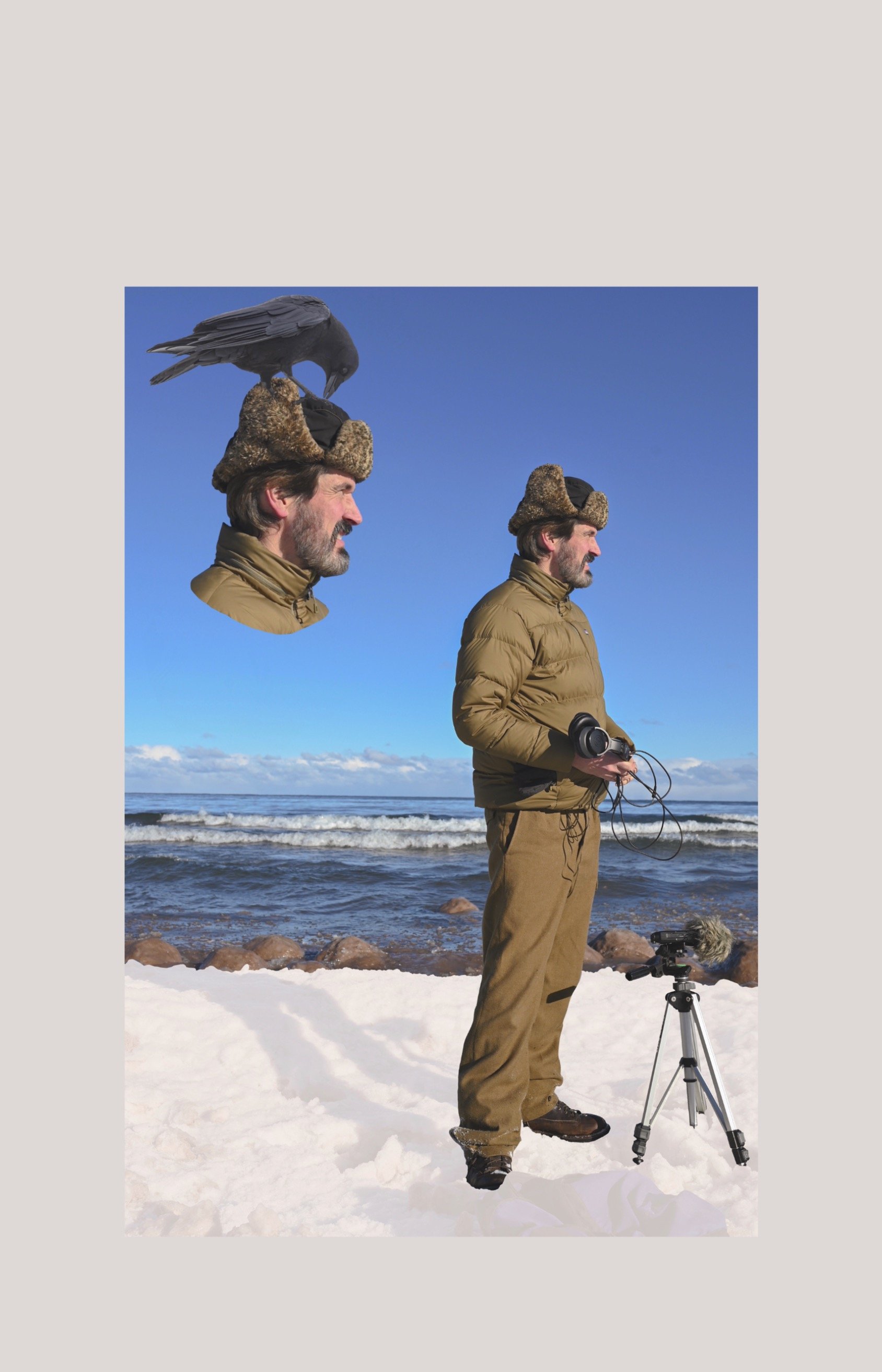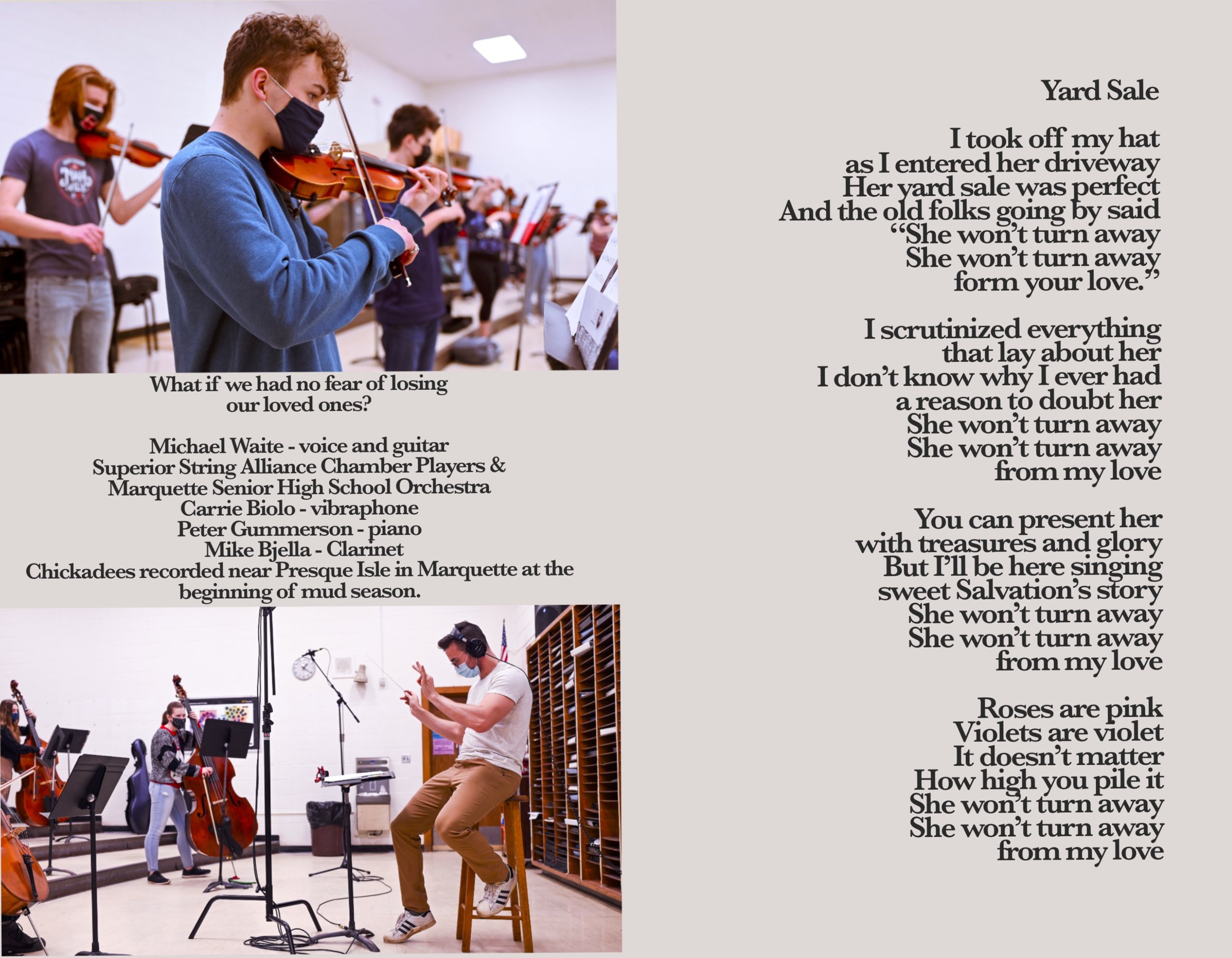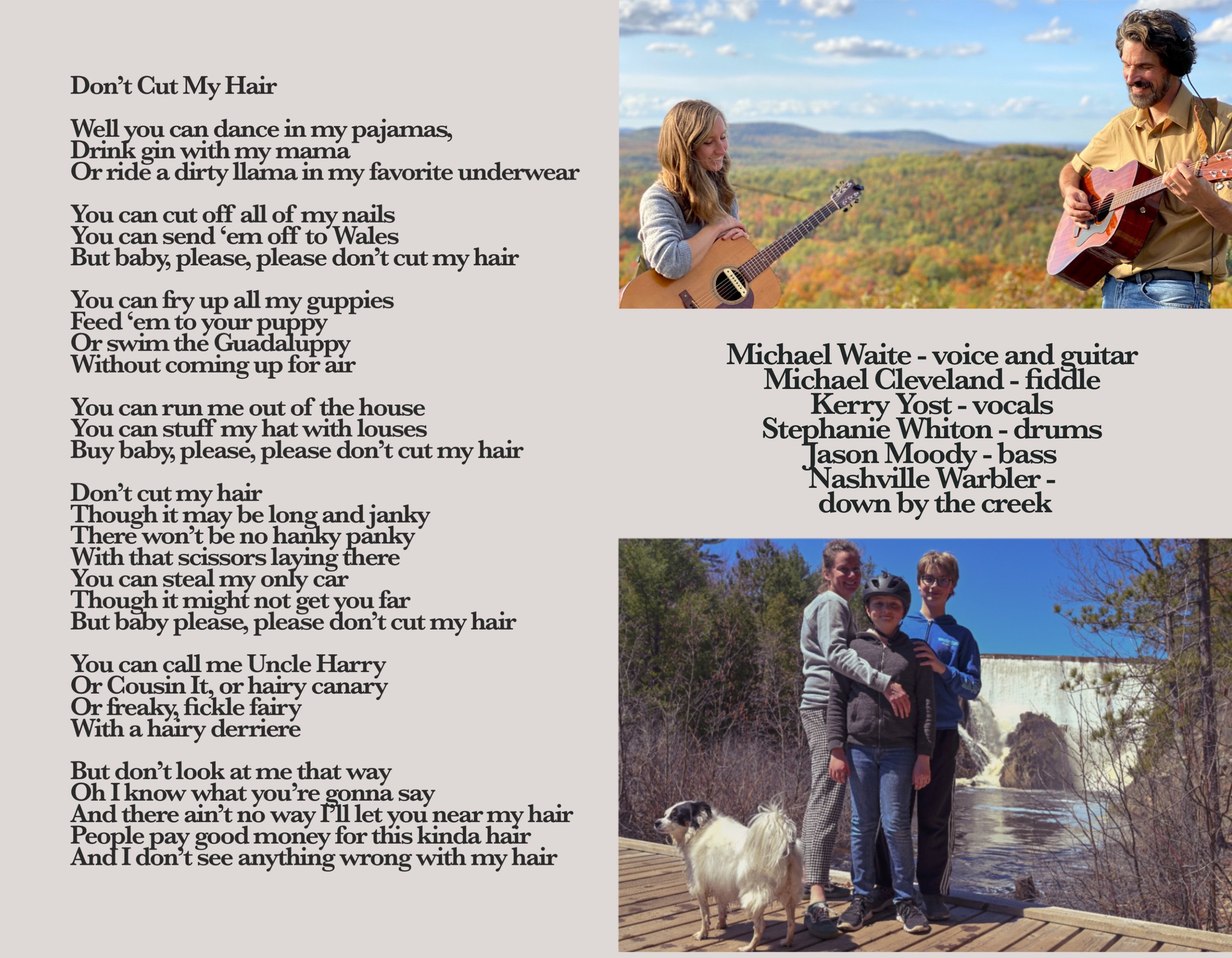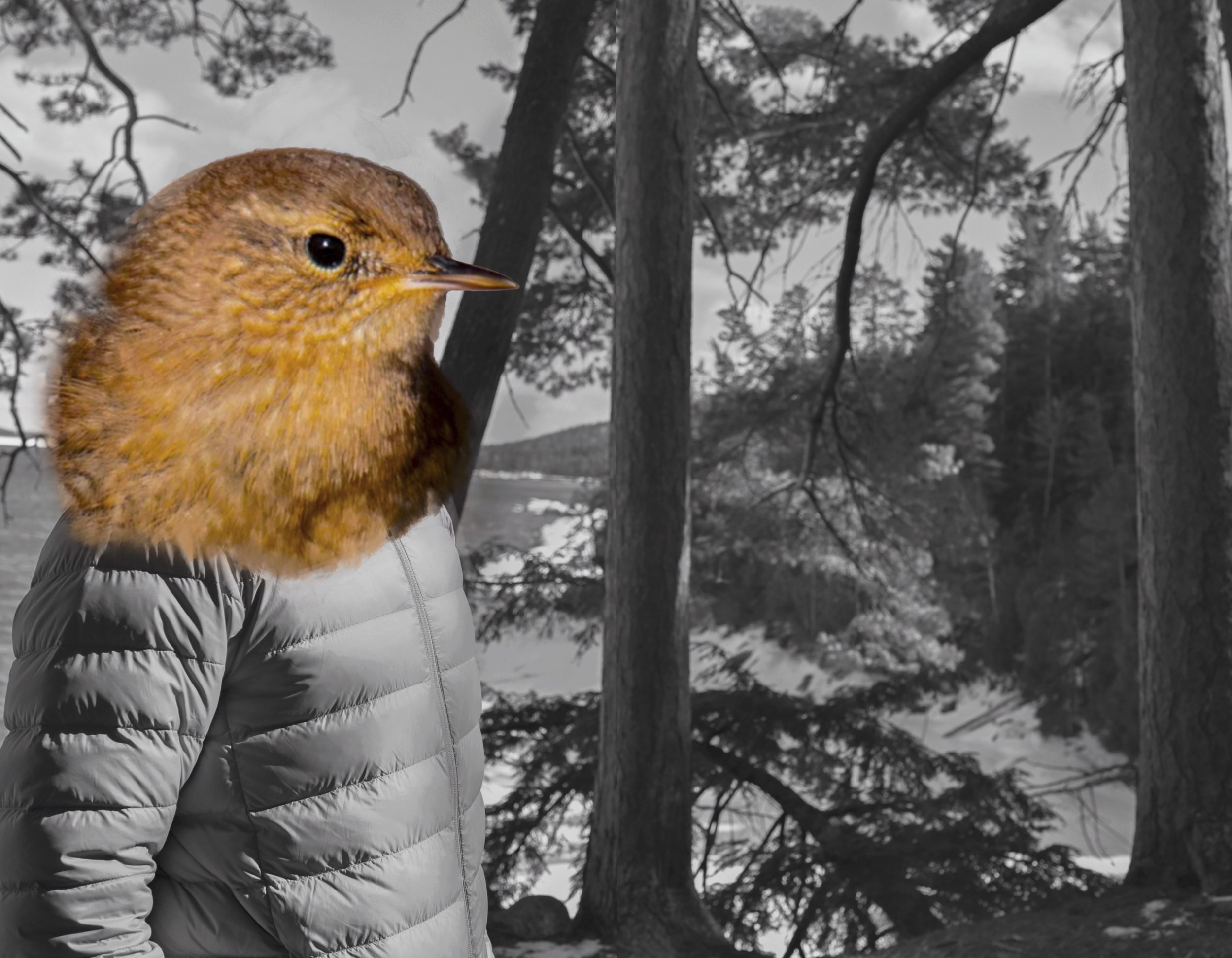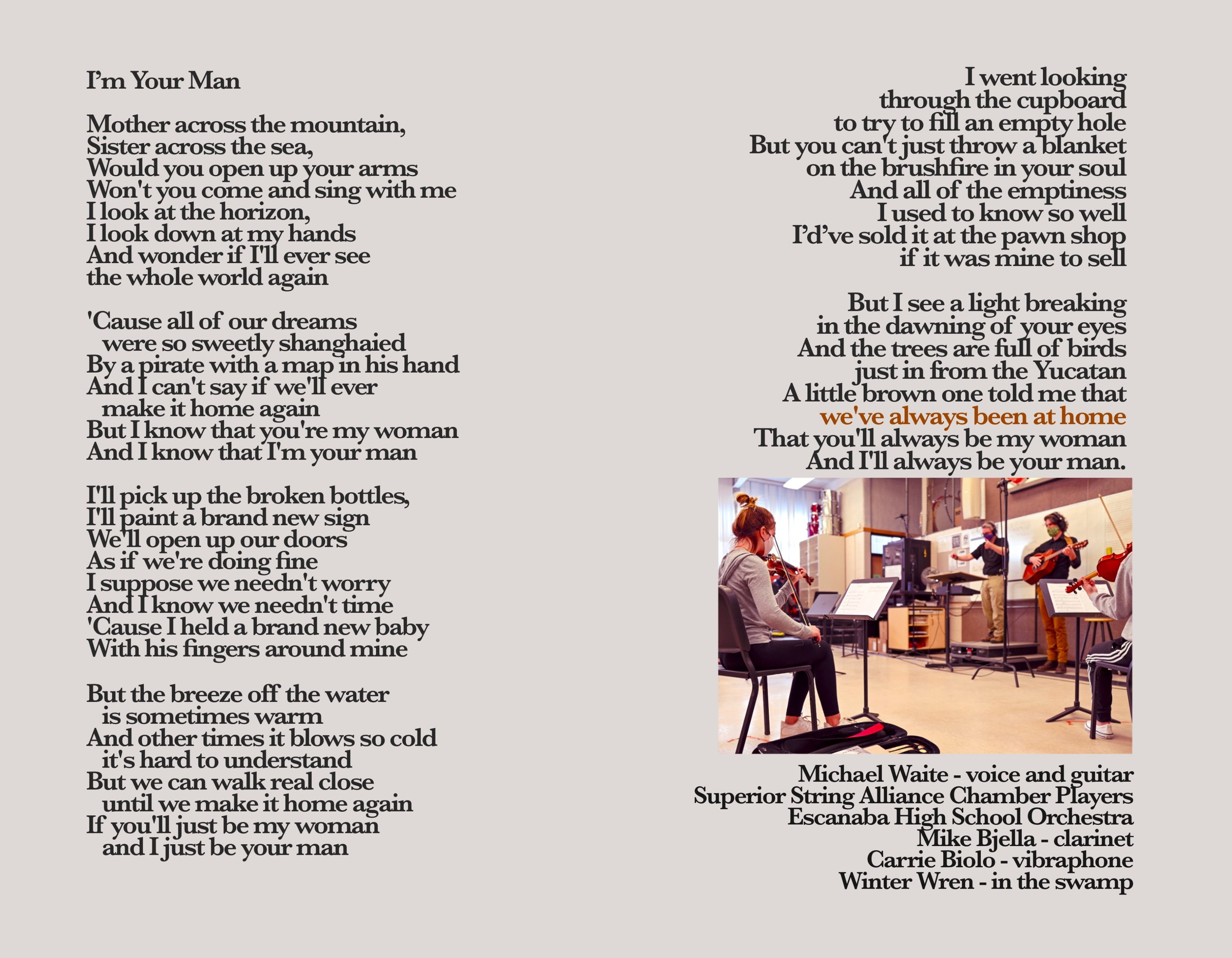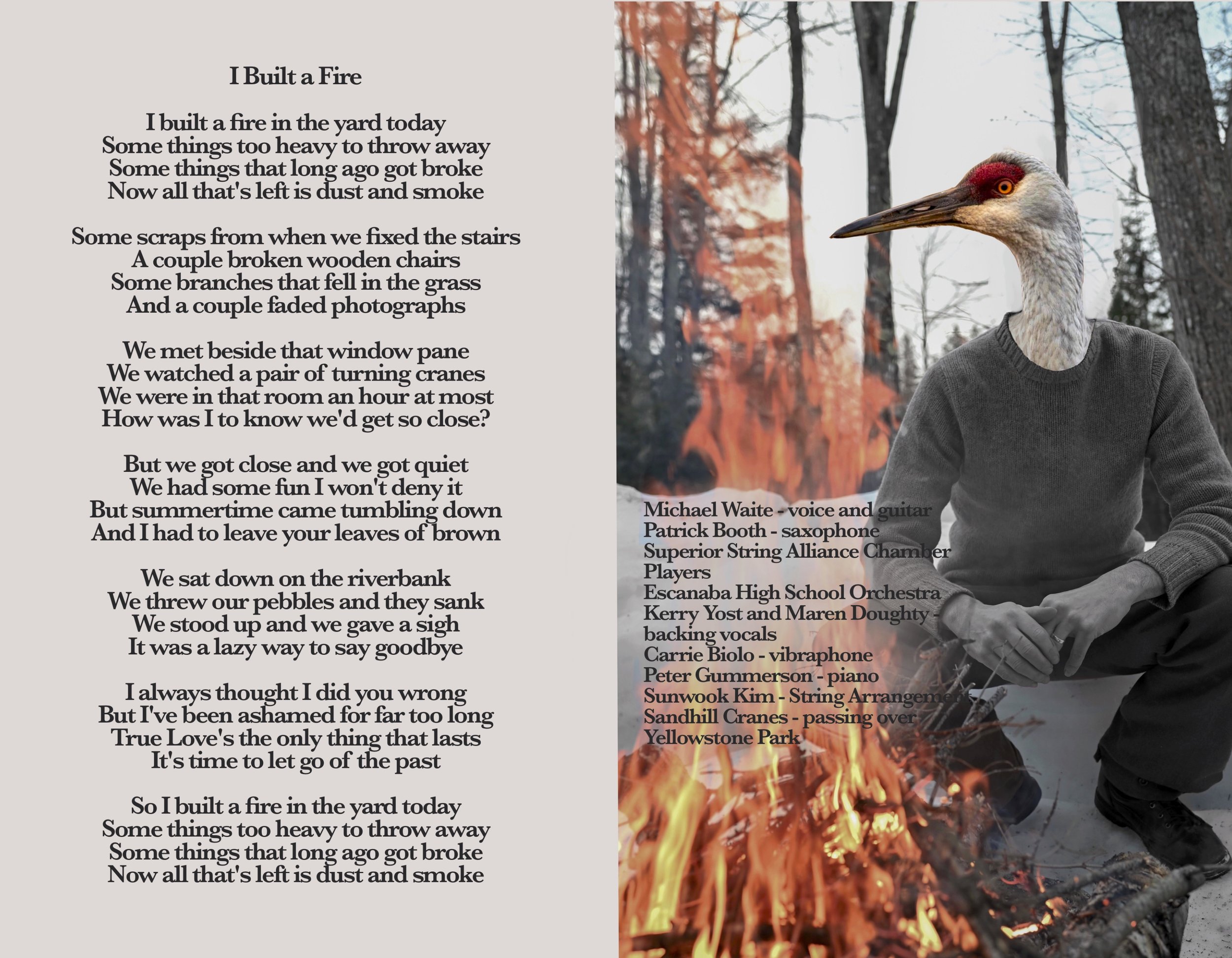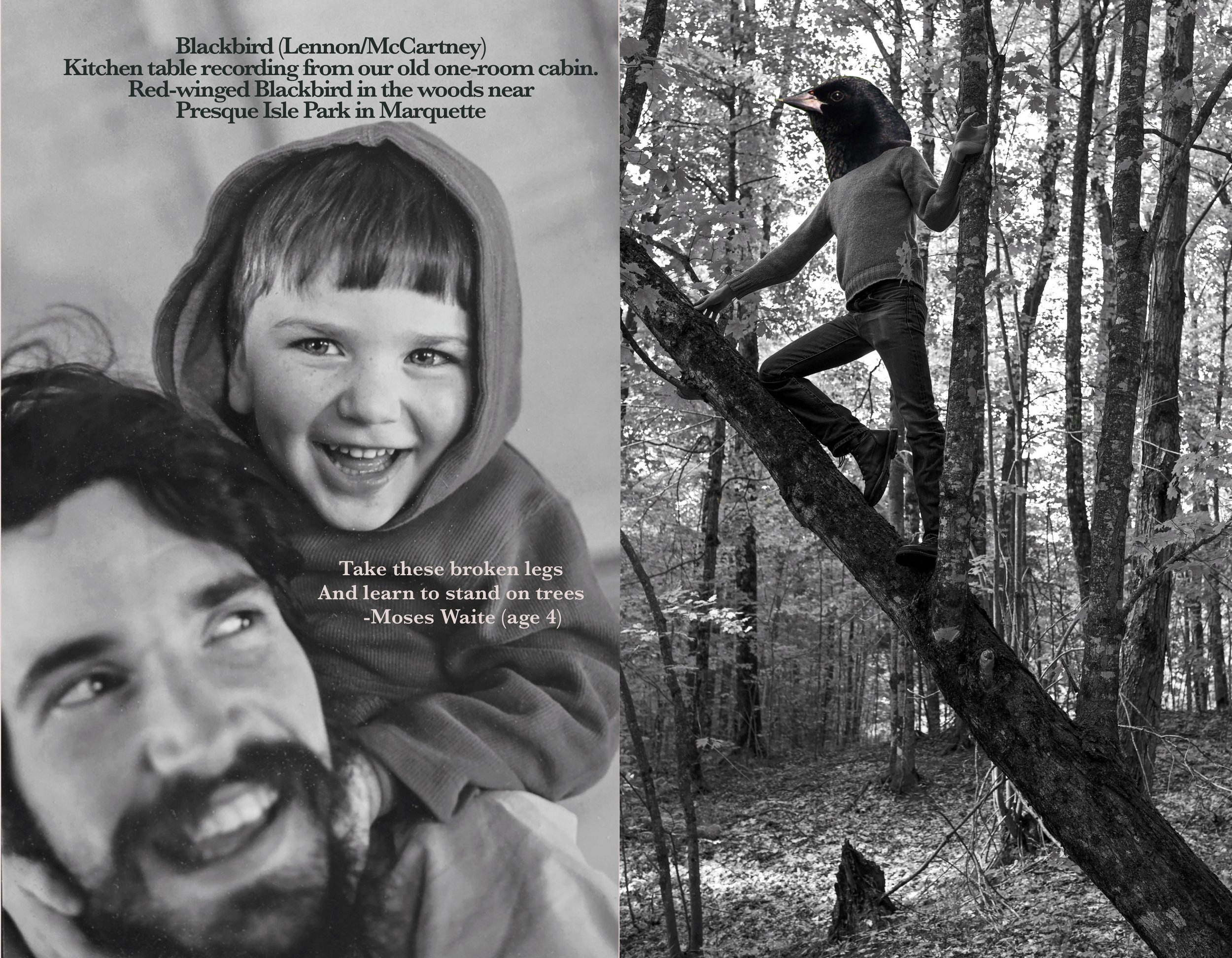Scroll down for lyrics and liner notes from We’ve Always Been at Home
— — — — — — —
Album Review by John Smolens
The birds in the morning
All seem to know my name.
I got everything I want,
‘cept the one thing that'll keep me sane
Down the path from Michael and Erica Waite's house, Wilson Creek winds through the numinous greenery of early September very much like the melody in a song accompanied by running water and chattering birds. There's little doubt that the new songs on Michael's CD We've Always Been at Home, released in October, found their inception in these woods.
True sincerity is rare these days; it's often too saccharine or tethered to some generic emotion cropped to fit on a T-shirt or bumper sticker. Michael Waite's lyrics are deeply, genuinely sincere, portraying the values of home and family and love, and the belief that place — in this case, the Upper Peninsula — matters. However, an undercurrent also runs through these songs, conveyed by unexpected rhymes and turns of phrase, suggesting darker, contrarian themes. At one point in "Bird Feeder Blues" Michael interjects,
"I'm so sick of my ego/I'm gonna try to rise above/I'm gonna listen to my heart." This attempt to exorcise a familiar, petulant demon is filled with instrumental riffs which may at first seem jarring, but soon it's apparent that those notes on clarinet and stringed instruments work within the context of the song's blues progression.
While contemporary pop music often sounds like something built on a computer with high octane looper repetition and bits of recorded noise called samples, We've Always Been at Home is refreshingly "un-pop": each song features stringed and brass instruments, orchestral arrangements and rhythms meted out with "found object percussion" instruments.
At the center of these tunes resides Michael's distinctive vocals and acoustic guitar. His voice, by turns languid, plaintive, and ebullient, possesses the range and inflection reminiscent of The Band's Richard Manuel. Michael plays his Guild acoustic guitar in the classic claw-hammer style that for generations has been the foundation of folk music. He grew up listening to recordings by guitarists such as James Taylor, Norman Blake and Antônio Carlos Jobim, playing the tunes repeatedly, until he could imitate the finger-picking accompaniment. Not surprisingly, stacks of records lie about the house. It's been a long time- decades since I've come across a Buffy St. Marie album.
I'm going out walking down a long steel blade
To try and make sense of it all
Laughing at the future and the mess that I made
When there's really only one way to fall
Like the house that Michael and Erica built on Wilson Creek, We've Always Been at Home took years to complete. Most of the songs were recorded in the house, while the orchestral accompaniments were performed by a quintet of friends and given depth by local high school orchestras, and keyboard segments were recorded in St. Paul's Episcopal Church in Marquette. With the exception of the traditional "Wayfaring Stranger," and a brief rendition of Paul McCartney's "Blackbird," Michael penned all the compositions and wrote the scores for the orchestras, resulting in songs layered with harmonic complexity.
When discussing how songs originate, Michael talked about where he and his family lived, about the look and feel of the land around their home, about the seasons that pass through northern Michigan, and, indeed, about the birds that inhabit the forest. Each tune begins with birdsong, nearly all of them recorded by Michael, and it's not difficult to imagine that some of those melodies might have first been suggested to him by warblers, wrens and seagulls. Furthermore, We've Always Been at Home is a collaborative effort, which is often one of the beauties of music. Friends and musicians came to the house, bearing an assortment of instruments and recording equipment, but most importantly, their ability to play those instruments in a manner that can express a complex palette of emotions. They set up on the second floor of the Waite house, in a large open room designed to serve as Erica's dance studio. The row of tall windows facing south admits sunlight through a skein of leaves, and overhead arches a gorgeous barrel ceiling
made of pine. For a musician, acoustics are essential; just a simple conversation in the dance studio sounds clear and honest, natural as the trees looming outside the windows.
I sit at my window
and look at the stars
And wonder whose heaven you're under
I bet you're on a tall ship,
somewhere real far
So full of resentment and wonder
The lyrics of every song are filled with images of the forest, of water, of animals (along with a variety of birds there's mention of a three-legged cat, a pony called Vixen, and a mule that intentionally doesn't rhyme with past). We are often reminded of what are inaccurately called the simple pleasures: the fragile beauty of a summer's day, the image of a newborn baby, or in the case of the rendition of "Blackbird" a child's unique perspective (Michael's son Moses revises McCartney's lyrics as only a four-year-old can). Each tune paints its own emotional landscape, and love is the common theme that binds all the songs together. Homage is paid to the ordinary miracles of a given day: the song of the river thrush, yard sales, the sea beneath a billowing sky. They are wistful, and they are often tinged with longing and, at times, regret. There is the sense that the singer is thankful for what he has, and yet there's the desire for so much more. If there is resolution, it comes with the realization that one must eventually let go, a notion that carries over from Michael's prevous CD Let It Go.
When asked how he writes songs, if he started with the lyrics, which he then put to music, or started with a melody and a chord progression, which led to the words, Michael said that both lyrics and music usually come to him all at once. When that happens, he would take notes, and in some instances record bits of the song on his phone.
You can call me Uncle Harry
Or Cousin It, or hairy canary
Or freaky, fickle fairy
With a hairy derriere
Michael Waite’s new album, We’ve Always Been at Home, takes the listener down a verdant and sinuous musical path. The lyrics to these songs are quirky, wry and often playful (sincerity works best when couched in humor); the rhyming schemes sneak up on the listener, twisting the meaning of a stanza, confirming a simple fact: life is a beautiful conundrum. There are few answers here; plenty of questions ("What if we had no fear of losing our loved ones?"), and when the music blends with birdsong the tune arrives at a place where answers might be found.
Little birds fly away
same thing happens every day
why's it gotta be that way?
John Smolens, NMU professor emeritus, has published 12 books, most recently Wolf's Mouth and Day of Days, both of which are Michigan Notable Book selections. In 2010, he received the Michigan Author Award from the Michigan Library Association.
Let it go
My first album is also available at Bandcamp.com and streaming on all the places like:
Amazon Music, and YouTube




